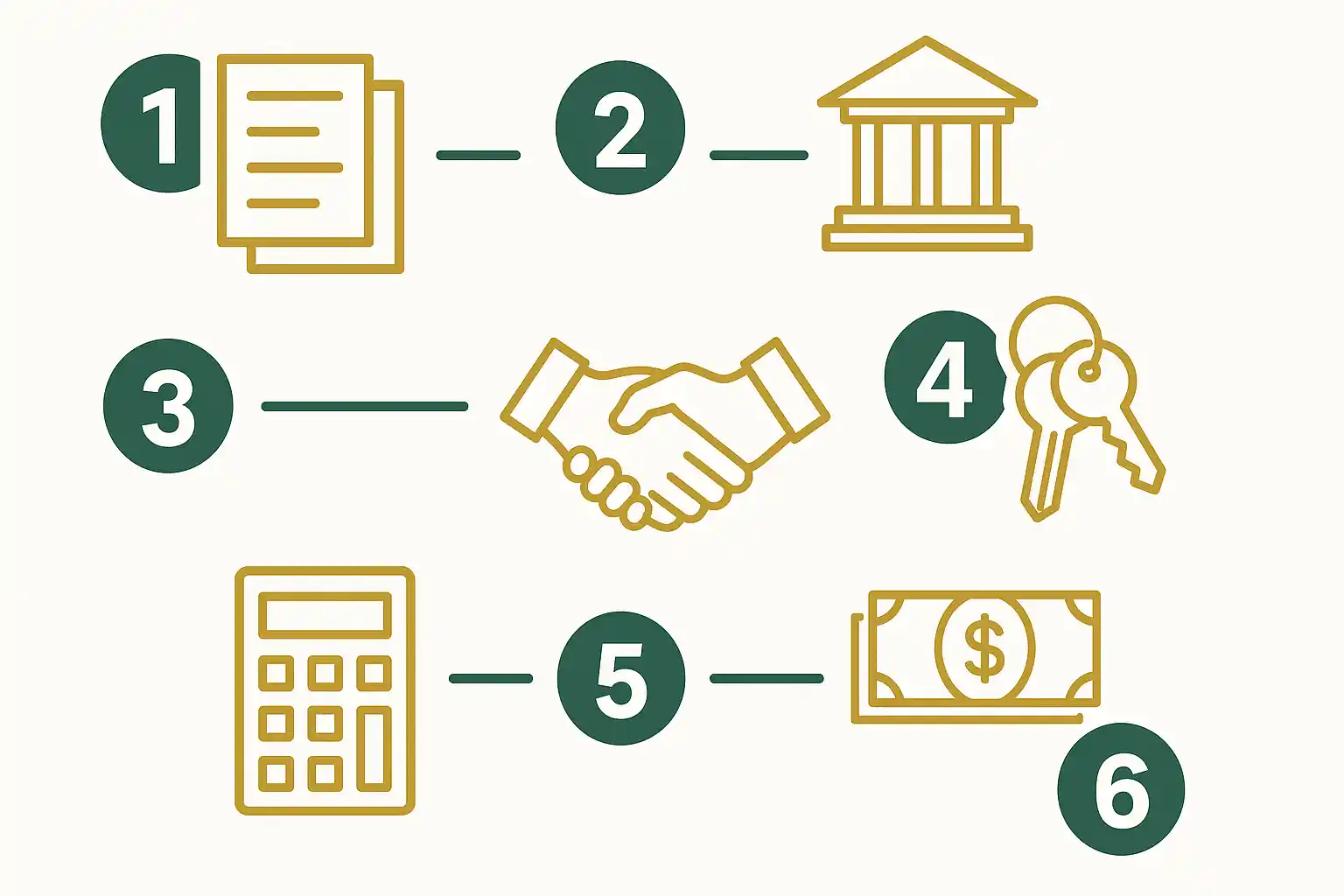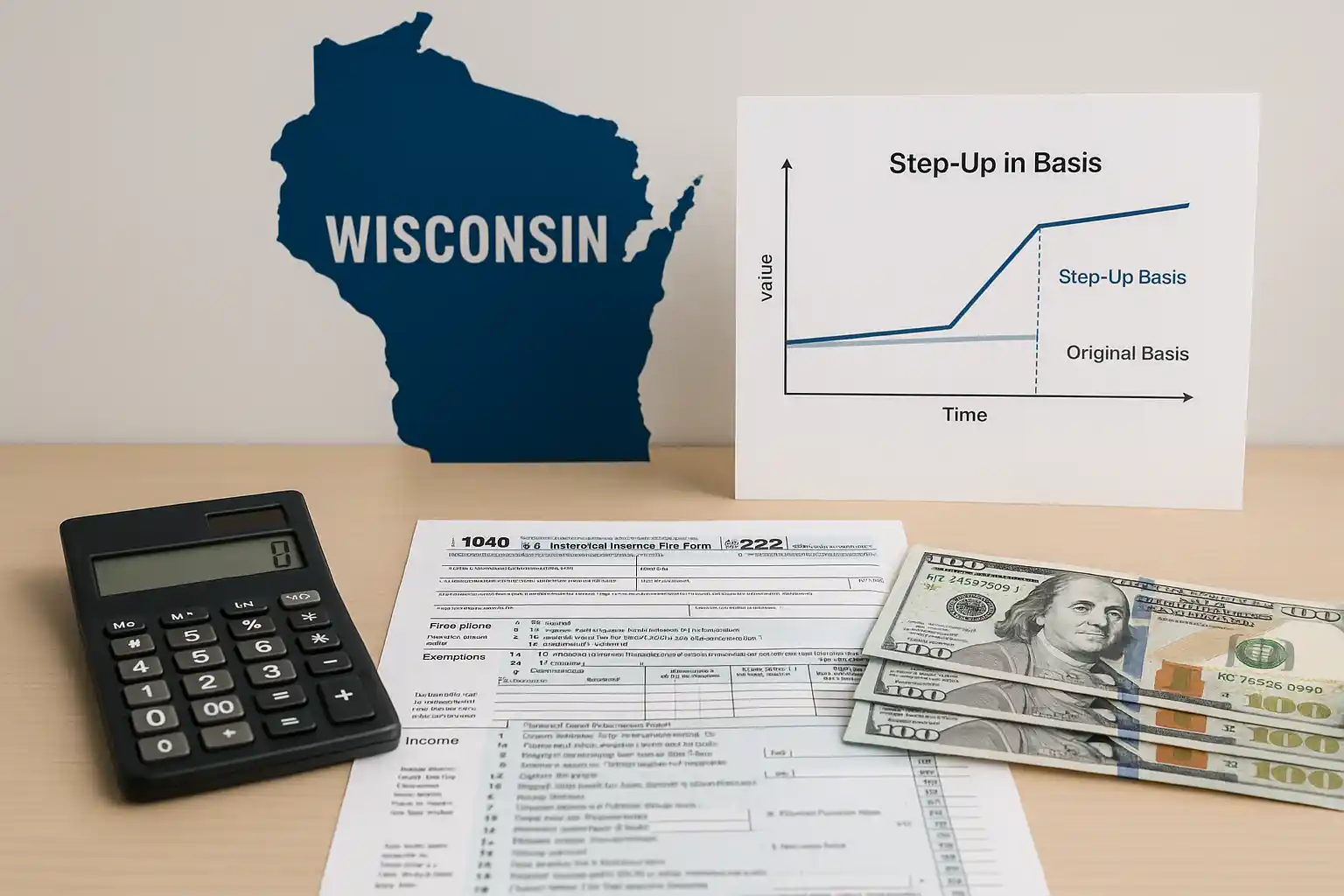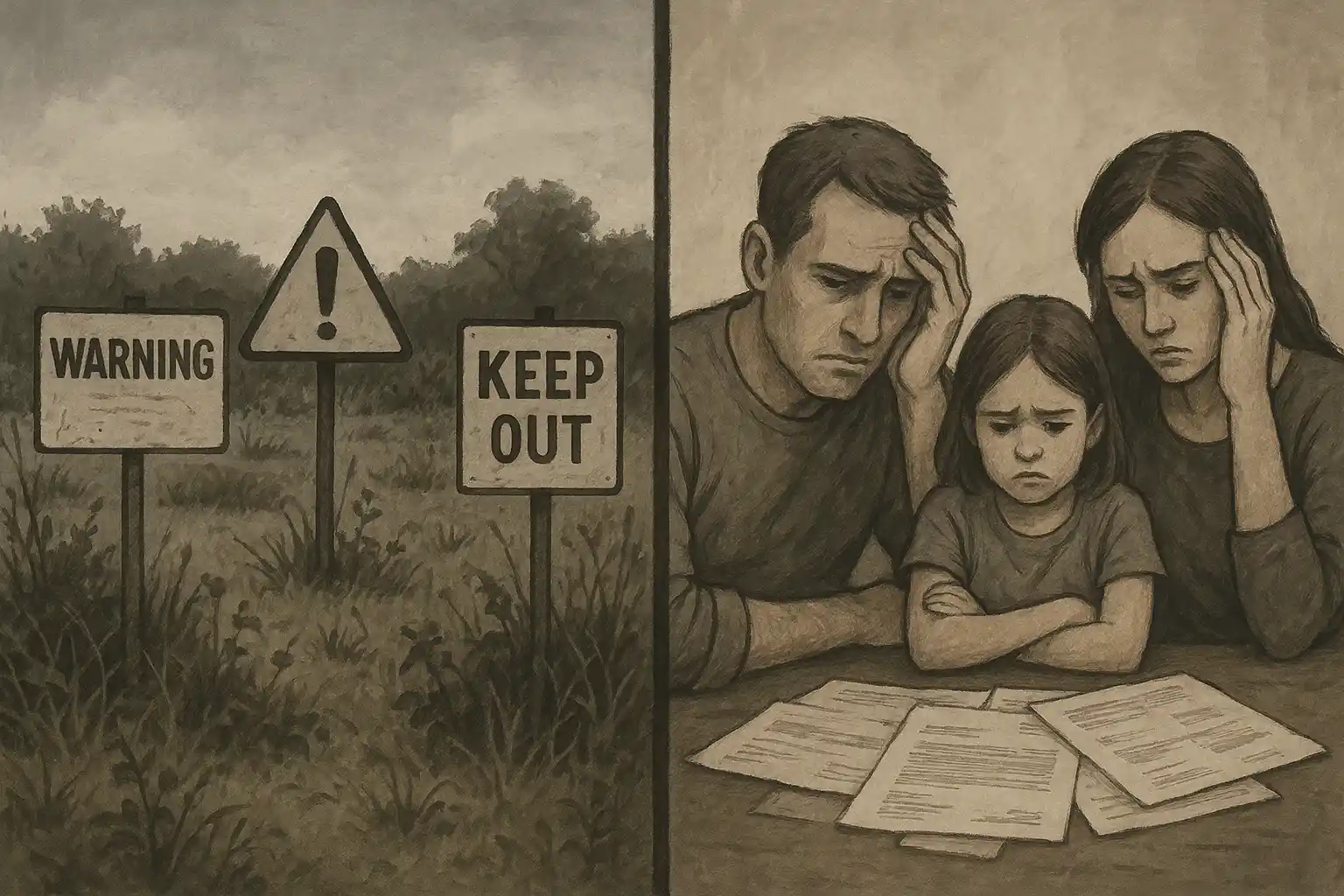Selling inherited land in Wisconsin requires completing probate, obtaining a clear title, and choosing between traditional listing or cash buyers. Wisconsin's probate process typically takes 6-18 months, but you can start exploring your options immediately.
This guide walks you through Wisconsin's specific laws, tax advantages, and practical steps to quickly and legally turn your inherited property into cash.
Key Takeaways
- Wisconsin offers valuable tax benefits for inherited land, including a stepped-up basis that eliminates capital gains on past appreciation.
- Multiple heirs can force a sale through Wisconsin's partition action laws if family members disagree about keeping the property.
- Cash buyers can close in 2-3 weeks after probate completion, while traditional sales typically take 6+ additional months.
Quick Note: If you're looking to skip the traditional sales process, we provide quick cash for Wisconsin land and can deliver a free, no-obligation offer within 48 hours.

Understanding Wisconsin Probate Laws for Inherited Land
Inheriting land in Wisconsin can feel overwhelming, especially when you're already dealing with the loss of a loved one. Don't worry—Wisconsin's probate system is designed to be manageable, and understanding the basics will help you navigate this process with confidence.
Wisconsin's Probate Options
Wisconsin offers different probate paths depending on your situation:
Informal Administration (Most Common)
- Streamlined process for straightforward estates
- Personal representative handles most tasks without court supervision
- Faster and less expensive than formal probate
- Still requires court filing and proper documentation
Small Estate Affidavit
- Available for estates with Wisconsin property valued under $50,000
- Skips formal probate entirely
- Requires a 30-day waiting period after death
- Must file with the Wisconsin Department of Health Services
Formal Administration
- Required for complex estates or when disputes arise
- The court supervises each step of the process
- More time-consuming, but provides additional legal protection
Personal Representative Responsibilities
If you're appointed as the personal representative, here's what you'll need to handle:
- File the initial probate petition with your local Wisconsin circuit court
- Inventory all estate assets, including the inherited land
- Notify creditors and beneficiaries according to Wisconsin law requirements
- Maintain the property during the probate process (taxes, insurance, upkeep)
- Distribute assets to heirs once debts are settled
Wisconsin's Unique Marital Property Advantage
Wisconsin is one of only nine marital property states, which can benefit surviving spouses:
- Enhanced inheritance rights for surviving spouses
- Potential "double step-up" tax basis on certain inherited assets
- Simplified ownership transfer for marital property
Timeline Expectations
Most Wisconsin probate cases take 6 to 18 months to complete, depending on complexity. Factors that can extend this timeline include:
- Property disputes between heirs
- Outstanding debts or liens on the land
- Challenges to the will's validity
- Complex property valuations
The good news? You don't have to wait until probate closes to explore your options for selling inherited land—including connecting with cash buyers who understand Wisconsin's probate requirements.

Step-by-Step Process to Sell Inherited Land in Wisconsin
Selling inherited land in Wisconsin involves several important steps, but breaking it down makes the process much more manageable. Here's your roadmap to navigate from probate filing to closing day.
Before You Can Sell: Essential Documentation
Gather These Documents First:
- Original death certificate (you'll need multiple certified copies)
- The deceased's will and any codicils
- Deed to the inherited property
- Recent property tax statements
- Any existing mortgage or lien information
File with Wisconsin Circuit Court:
- Probate petition and required forms
- Application for informal administration (if applicable)
- Inventory of estate assets, including land value
Getting Legal Authority to Sell
You can't legally sell inherited land until you have proper authority. In Wisconsin, this means:
Personal Representative Appointment
- The court issues Letters Testamentary or Letters of Administration
- This document proves your legal right to act for the estate
- Most title companies and buyers will require this before proceeding
Clear Title Requirements
- Order a title search to identify any liens or encumbrances
- Resolve outstanding property taxes or assessments
- Address any title defects before listing the property
Your Selling Options in Wisconsin
Once you have clear legal authority, you have several paths forward:
Traditional Sale Process
- Hire a real estate agent familiar with Wisconsin land sales
- List on MLS and market to potential buyers
- Navigate showings, negotiations, and financing contingencies
- Timeline: 6-12 months after probate completion
For more detailed guidance on the traditional approach, check out our complete guide to selling land by owner in Wisconsin. Have a unique property in WI? Check out how to sell Wisconsin lakefront or hunting land.
Direct Cash Sale
- Skip lengthy marketing and showing periods
- Avoid realtor commissions (typically 6-10% in Wisconsin)
- Close in 2-3 weeks once the title is clear
- Ideal for heirs who want a quick resolution
Wisconsin-Specific Considerations
Property Tax Timing
- Wisconsin property taxes are paid in arrears
- Ensure all back taxes are current before sale
- Budget for prorated taxes at closing. Read more on Wisconsin land sale tax implications
Seasonal Market Factors
- Wisconsin land sales peak in the spring and summer months
- Winter sales may take longer, but cash buyers operate year-round
- Consider timing based on your family's needs, not just market conditions
The key is choosing the path that best fits your timeline, financial needs, and family situation during this challenging time.

Tax Implications: Step-Up Basis and Capital Gains in Wisconsin
Understanding the tax benefits of inheriting land can save you thousands of dollars. Wisconsin offers some unique advantages that many heirs don't realize they have, so let's break down what this means for your wallet.
The Step-Up Basis Advantage
When you inherit land in Wisconsin, you receive what's called a "stepped-up basis"—essentially resetting the property's value for tax purposes:
How Step-Up Basis Works:
- Your tax basis becomes the property's fair market value on the date of death
- Eliminates capital gains tax on appreciation during the deceased's ownership
- Only future appreciation after inheritance is subject to capital gains
- Applies to all inherited real property in Wisconsin
Example: If your parent bought land for $50,000 in 1990, and it's worth $200,000 today, your stepped-up basis is $200,000—not $50,000. If you sell immediately, you owe no capital gains tax on that $150,000 appreciation.
Wisconsin's Unique "Double Step-Up" Advantage
Wisconsin's marital property laws can provide even greater tax benefits for surviving spouses:
Marital Property Benefits:
- Both spouses' shares of marital property get a stepped-up basis
- Can eliminate capital gains on the entire property, not just the deceased spouse's half
- Requires proper marital property classification before death
- Available through marital property agreements or classifications
To understand current property values and potential tax implications, check out our analysis of cost of land in Wisconsin by county.
Wisconsin Tax Obligations
Good News for Wisconsin Heirs:
- No Wisconsin state inheritance tax on inherited property
- No Wisconsin state estate tax (only federal estate tax may apply)
- Federal estate tax only applies to estates over $13.61 million (2024)
Potential Federal Taxes:
- Federal estate tax for very large estates
- Capital gains tax on future appreciation after inheritance
- Depreciation recapture if the property was used for rental or business use
Important Tax Planning Considerations
Record Keeping Essentials:
- Obtain a professional appraisal for the date-of-death value
- Keep all documentation proving the stepped-up basis
- Track any improvements made to the property after inheritance
- Maintain records of carrying costs during probate
When to Consult Professionals:
- Estate values approaching federal exemption limits
- Complex family structures with multiple properties
- Questions about marital property classification
- Inherited property with rental or business use history
Capital Gains Strategy
Timing Your Sale:
- Immediate sale after inheritance typically results in minimal capital gains
- Holding period doesn't affect step-up basis benefits
- Consider your overall income situation when planning sale timing
- Cash sales can close quickly to minimize additional appreciation
The bottom line? Wisconsin's inheritance tax laws are generally favorable to heirs, especially when combined with strategic timing and professional guidance. Don't let tax concerns prevent you from making the best decision for your family's financial future.

Common Challenges When Selling Inherited Wisconsin Land
Selling inherited land rarely goes as smoothly as you'd hope. Even with the best intentions, you'll likely face hurdles that can turn a straightforward process into months of stress and unexpected expenses. Here are the most common challenges Wisconsin heirs encounter—and how to navigate them.
Title and Legal Complications
Clouded Title Issues:
- Missing or incomplete deed records from previous transfers
- Boundary disputes with neighboring landowners
- Unpaid liens or judgments against the property
- Errors in legal descriptions or survey discrepancies
Common Wisconsin-Specific Problems:
- Old timber rights or mineral rights separations
- Easement disputes, especially on rural properties
- Historical tax deed issues in some counties
- Missing probate records from decades-old transfers
Getting a title search done early can reveal these issues while you still have time to address them properly.
Financial Burdens During Probate
Ongoing Carrying Costs:
- Wisconsin property taxes continue accruing during probate
- Insurance premiums to protect against liability
- Maintenance costs for vacant land (brush clearing, fence repairs)
- Legal fees for probate administration
Hidden Expenses That Add Up:
- Survey costs if boundaries are disputed
- Environmental assessments for potential contamination
- Back taxes and penalties if payments were missed
- Court fees and administrative costs throughout probate
Property Maintenance Challenges
Vacant land might seem low-maintenance, but inherited Wisconsin property often needs attention:
Rural Property Issues:
- Overgrown brush and invasive species management
- Fence line maintenance and boundary marking
- Road access maintenance, especially for seasonal roads
- Wildlife damage or unauthorized use by neighbors
Liability Concerns:
- Attractive nuisance issues if property has structures
- Hunting accidents or trespasser injuries
- Environmental liability for any contamination
- Fire danger from unmaintained brush or debris
Market Timing and Seasonal Factors
Wisconsin's Challenging Market Conditions:
- Long, harsh winters limit property showings
- Spring market surge creates competition but also opportunities
- Rural land markets can be extremely slow and unpredictable
- Economic uncertainty affecting land values
Emotional Pressure vs. Market Reality:
- Feeling rushed to sell while markets are soft
- Family pressure to "get something" rather than wait for better prices
- Carrying costs mounting while waiting for the right buyer
- Difficulty determining fair market value for unique properties
Family Dynamics and Communication
Common Family Tensions:
- Disagreements about sale timing or pricing
- Unequal financial contributions to property maintenance
- Sentimental attachment vs. practical financial needs
- Geographic distance making group decisions difficult
Decision-Making Paralysis:
- Multiple heirs with different financial situations
- Conflicting opinions about keeping vs. selling
- Difficulty scheduling meetings and coordinating responses
- Legal requirements for unanimous consent on major decisions
The Emotional Toll
Perhaps the most underestimated challenge is the emotional burden of handling a loved one's property:
- Overwhelming responsibility during a time of grief
- Guilt about selling family land or property
- Stress of learning complex legal and tax requirements
- Family relationship strain over financial decisions
These challenges don't have to derail your plans. Many Wisconsin families find that working with experienced cash buyers eliminates most of these headaches, allowing them to focus on what matters most during a difficult time.

Multiple Heirs: Selling Inherited Wisconsin Land with Siblings
When you inherit land with siblings or other family members, what starts as a shared blessing can quickly become a source of family tension. Wisconsin law provides mechanisms to resolve these disputes, but understanding your options can help you find solutions that preserve both your financial interests and family relationships.
Wisconsin's Partition Action Laws
When heirs can't agree on whether to sell inherited land, Wisconsin provides a legal remedy called partition:
How Partition Actions Work:
- Any co-owner can petition Wisconsin circuit court to force a sale
- Court will attempt physical division first, but land is rarely divisible
- If physical division isn't practical, court orders a judicial sale
- Sale proceeds are distributed based on each heir's ownership percentage
The Partition Process in Wisconsin:
- File petition with circuit court in the county where land is located
- Notify all co-owners of the legal action
- Court appoints referee to oversee sale process
- Property is sold at public auction or through court-approved private sale
- Legal fees and court costs are deducted from sale proceeds
Common Sibling Disagreements
Typical Sources of Family Conflict:
- One heir wants to keep the land, others want to sell
- Disagreement over fair market value and listing price
- Different financial pressures and timeline needs
- Sentimental attachment vs. practical financial considerations
- Geographic distance making joint management difficult
Emotional Factors That Complicate Decisions:
- Childhood memories and family history tied to the property
- Guilt about "selling the family land"
- Different relationships with the deceased parent
- Varying financial situations among siblings
Alternatives to Court Action
Before heading to court, consider these Wisconsin-friendly alternatives:
Buyout Agreements:
- One or more siblings purchase others' shares at appraised value
- Establish payment terms that work for all parties
- Use neutral third-party appraisal to determine fair price
- Consider seller financing if buyers need payment flexibility
Family Mediation:
- Work with neutral mediator to facilitate discussions
- Less expensive and faster than court litigation
- Helps preserve family relationships
- Can result in creative solutions courts might not consider
Professional Property Management:
- Hire management company if land generates income
- Establish clear decision-making procedures
- Set up shared expense and income distribution system
- May work as temporary solution while planning sale
Decision-Making Challenges
Legal Requirements for Joint Decisions:
- Major decisions typically require unanimous consent
- Wisconsin law varies based on how ownership is structured
- Some actions may require majority agreement only
- Personal representative may have authority during probate
Practical Strategies for Group Decisions:
- Establish clear communication protocols
- Set deadlines for responses and decisions
- Use written agreements for all major choices
- Consider professional facilitation for family meetings
Financial Considerations with Multiple Heirs
Unequal Contributions:
- Track who pays for taxes, insurance, and maintenance
- Establish agreements about expense sharing
- Consider reimbursement from sale proceeds
- Document all expenditures for fair distribution
Tax Planning for Multiple Owners:
- Each heir gets stepped-up basis on their share
- Capital gains calculated individually based on ownership percentage
- Consider timing of sale for tax optimization
- Coordinate with tax professionals for complex situations
When Cash Buyers Make Sense for Families
Benefits for Multiple Heir Situations:
- Eliminates lengthy decision-making about marketing strategy
- Provides quick resolution to family disagreements
- Avoids ongoing maintenance and carrying costs
- Reduces legal fees and court involvement
- Allows fair, immediate distribution among all heirs
Many Wisconsin families find that accepting a cash offer, even at a slight discount, saves more money in the long run by avoiding legal fees, carrying costs, and family stress. Sometimes the fastest path forward is simply the best path forward.

Fast-Track Option: Selling Inherited Wisconsin Land for Cash
After years of helping Wisconsin families navigate inherited land sales, I've seen firsthand how overwhelming this process can become. That's why we created a simpler path at Prime Land Buyers—one that eliminates most of the headaches you've been reading about.
Why Families Choose Our Cash Process
Skip the Traditional Hassles:
- No realtor commissions (save 6-10% immediately)
- No lengthy marketing periods or uncertain showings
- No financing contingencies that fall through
- No family arguments about pricing or timing
Perfect for Inherited Land Situations:
- We understand Wisconsin probate requirements
- Work directly with personal representatives
- Close in 3-4 weeks once the title is clear
- Handle all paperwork and closing costs
Our Wisconsin Experience
I've worked with families across Wisconsin—from rural Polk County farms to residential lots in Madison suburbs. We know the local markets, understand seasonal challenges, and respect the emotional difficulty of selling family land.
Our Simple Process:
- Submit your property details online
- Receive a fair cash offer within 48 hours
- Choose your closing date (we're flexible)
- Get paid through secure escrow
Whether you're dealing with sibling disagreements, mounting carrying costs, or just want to move forward quickly during a difficult time, we're here to help. Ready to sell land in Wisconsin without the stress? Let's talk.

